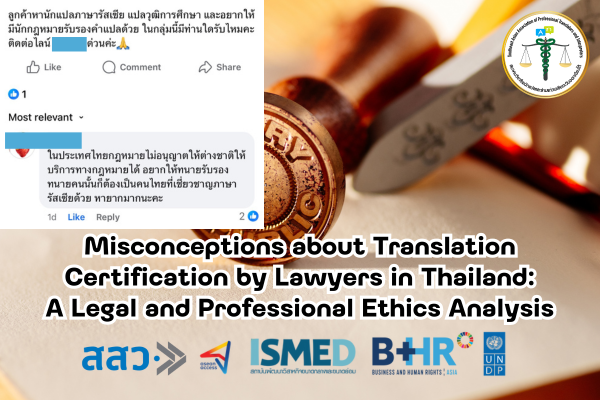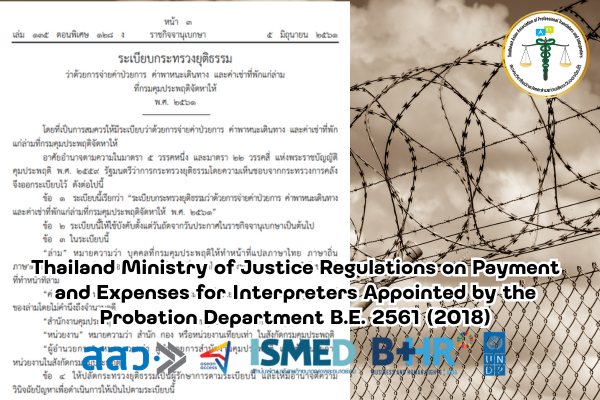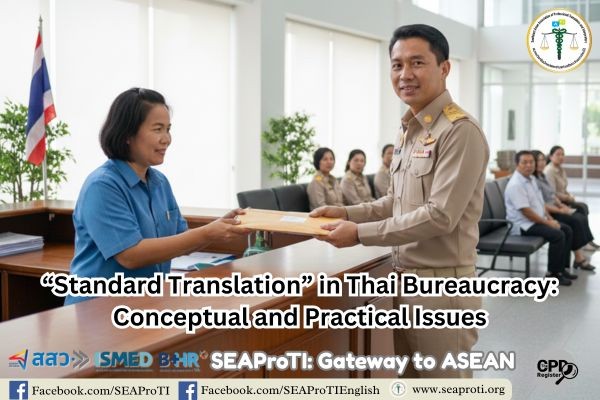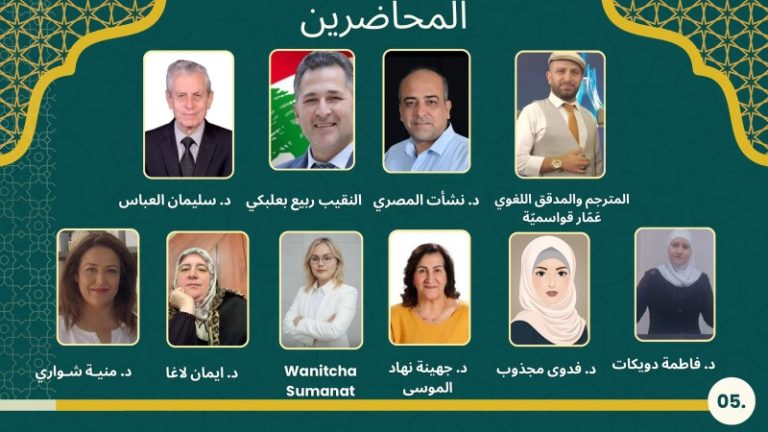Misconceptions about Translation Certification by Lawyers in Thailand:
A Legal and Professional Ethics Analysis
May 16, 2025, Bangkok — In recent years, there has been a growing trend in Thailand of advertising translation certification services provided by lawyers or legal practitioners. However, Thai law does not grant legal authority to lawyers to certify the accuracy of translated documents. This article analyzes the legal framework governing translation certification for official documents, the ethical implications for both translators and legal professionals, and the potential risks involved. It draws on governmental policies and relevant laws to offer practical guidelines for stakeholders in the translation industry.
1. Introduction
The phrase “certified by a lawyer” has become a popular marketing term in translation services, especially for documents intended for submission to government agencies or foreign institutions. While Thailand has laws specifying who may legally certify translations (as found in the Administrative Procedure Act B.E. 2539 (1996), amended B.E. 2540 (1997)), no provision authorizes lawyers to certify translations. Nonetheless, the misconception persists, and the practice continues, often without a legal basis. This presents legal risks for clients, public institutions, and service providers.
2. Legal Framework
According to the Administrative Procedure Act (1996/1997 Amendment), official document translations submitted to state agencies must be certified by individuals who meet specific qualifications:
(1) Thai nationals who hold at least a bachelor’s degree from a program taught in the language appearing in the document.
To elaborate:
1.1 Thai nationals
- “Thai nationals” refers strictly to those holding Thai citizenship.
- Foreign nationals, even with high language proficiency, are not eligible.
2. Hold at least a bachelor’s degree from a program taught in the language appearing in the document
- “At least a bachelor’s degree” means that an associate’s degree or diploma does not qualify. A master’s or doctoral degree is acceptable.
- “Program taught in the language of the document” implies that the language must be the medium of instruction across the curriculum, not just in elective subjects.
Examples:
- A Thai person who graduated in France with a program taught in French can certify French translations.
- A Thai person with an international program law degree whose curriculum is taught in English in France can only certify English, not French translations, because French was not the language of instruction.
- A Thai person who studies in Thailand and only takes French courses as electives would not qualify under this law.
(2) University-level instructors who teach the language appearing in the document.
(3) Foreign embassies or consulates in Thailand, provided the language is an official language of the corresponding country.
(4) Thai embassies or consulates abroad.
3. Legal and Ethical Implications of False Certification by Lawyers
- Legal Consequences: A lawyer signing off on a translation without legal authority could be liable for making false declarations to public officials under the Criminal Code Sections 137 or 268.
- Professional Ethics: Lawyers knowingly certifying translations without meeting legal qualifications could face disciplinary action for breaching professional ethics.
- Translation Industry Standards: Translators collaborating with unauthorized certifiers may violate consumer protection laws and ethical standards for language professionals.
4. Recommendations
- For Translators and Agencies: While translation agencies may be lawfully registered with the Department of Business Development, only individuals listed in the Administrative Procedure Act may certify official translations.
- For Lawyers: Lawyers should avoid certifying translations unless they meet the legal requirements defined under Thai law.
- For Clients: Always verify that certification is issued by a legally qualified person or entity. Using uncertified translations could lead to rejection or legal consequences.
- For Government Agencies: Government bodies must operate in accordance with the law. Though some internal guidelines (e.g., at the Department of Consular Affairs) allow for certified self-declarations by translators in areas lacking qualified personnel, this should be viewed as an interim measure. In large cities with ample qualified professionals, agencies should require certifications from authorized individuals or associations, such as SEAProTI.
Advancing Translator Certification:
SEAProTI’s Role in Raising Standards in Thailand and beyond
In Thailand’s administrative framework, certified translations are essential for official documentation, particularly in international contexts. However, prior to 2024, there was no centralized mechanism for assessing the qualifications of translators. In response, the Southeast Asian Association of Professional Translators and Interpreters (SEAProTI) launched a new certification framework aligning with public administration ethics and professional standards.
1. Establishing Certified Translator Status
As of 2024, SEAProTI mandated that the Certified Translator and the Translation Certification Provider must be the same person, ensuring accountability and transparency. This eliminates loopholes where translation and certification are separated and quality control is lost.
This standard was officially registered in SEAProTI’s bylaws (Chapters 9 and 10) and published in the Royal Gazette on July 25, 2024 (Volume 141, Part 66 Ng, Page 100). It was also duly recorded with the Department of Provincial Administration, Ministry of Interior.
2. Legal Interpretation and the Proposed “Clause (5)”
SEAProTI, in consultation with the Council of State, has explored the possibility of amending the Administrative Procedure Act by adding Clause (5) under Article 1 to allow:
- “Individuals who have completed accredited training, passed certification exams, and are registered with private organizations such as professional associations or language schools.”
If enacted, this would legally recognize certified language professionals—even if they did not graduate from a foreign-language academic program—as valid translation certifiers under Thai law.
3. Professional and Legal Impact
This proposal would expand legal recognition to professionals certified by SEAProTI or similar institutions. It provides legal standing to Thai-educated professionals who meet stringent linguistic and ethical standards, even if they do not fall under Clauses (1)-(4).
However, SEAProTI’s certification process is rigorous, requiring language proficiency assessments, ethics training, and verified experience. Thus, the program does not cater to individuals without relevant qualifications, despite growing demand in the field.
Therefore, it is recommended to use certified translators and translation certifiers who bear a stamp from a credible third-party certifying body or organization.
4. Conclusion
SEAProTI’s initiatives since 2024 mark a pivotal development in Thailand’s professional translation sector. By aligning legal compliance with professional ethics and international best practices, SEAProTI offers a model for transparent, reliable translation certification. Should Clause (5) be incorporated into the Administrative Procedure Act, Thailand will achieve a clearer, standardized, and internationally recognized framework for translation verification.
References
- Council of State. (1997). Administrative Procedure Act B.E. 2539 (1996), as amended B.E. 2540 (1997). Bangkok: Office of the Prime Minister.
- Royal Gazette. (2024). Bylaws of the Southeast Asian Association of Professional Translators and Interpreters, Chapters 9–10. Volume 141, Part 66 Ng, Page 100, July 25, 2024.
- SEAProTI. (2024). Certified Translator Regulations and Registration Standards. Bangkok: Southeast Asian Association of Professional Translators and Interpreters.
- Office of the Permanent Secretary, Ministry of Interior. (2024). Official Announcement on the Recognition of Association Bylaws Registered under the Department of Provincial Administration. Bangkok: Ministry of Interior.
Read more: Proposal to Amend the Ministerial Regulation on Certified Translations under the Administrative Procedure Act B.E. 2539 (1996) (Click here)
SEAProTI’s certified translators, translation certification providers, and certified interpreters:
The Southeast Asian Association of Professional Translators and Interpreters (SEAProTI) has officially announced the criteria and qualifications for individuals to register as “Certified Translators,” “Translation Certification Providers,” and “Certified Interpreters” under the association’s regulations. These guidelines are detailed in Sections 9 and 10 of the Royal Thai Government Gazette, issued by the Secretariat of the Cabinet under the Office of the Prime Minister of the Kingdom of Thailand, dated July 25, 2024, Volume 141, Part 66 Ng, Page 100.
To read the full publication, visit: the Royal Thai Government Gazette
ความเข้าใจผิดเกี่ยวกับการรับรองคำแปลโดยทนายความในประเทศไทย: บทวิเคราะห์เชิงกฎหมายและจริยธรรมทางวิชาชีพ
16 พฤษภาคม 2568, กรุงเทพมหานคร – ในช่วงหลายปีที่ผ่านมา พบว่ามีการโฆษณาและให้บริการรับรองคำแปลโดยทนายความหรือนักกฎหมายในประเทศไทยเพิ่มขึ้น ทั้งที่กฎหมายไทยมิได้ให้อำนาจทางกฎหมายแก่ทนายความหรือนักกฎหมายในการรับรองความถูกต้องของคำแปลเอกสารแต่อย่างใด บทความนี้จึงมุ่งวิเคราะห์กรอบกฎหมายที่เกี่ยวข้องกับการรับรองคำแปล เอกสารที่ใช้ในราชการ รวมถึงจริยธรรมของวิชาชีพทั้งนักแปลและทนายความ ตลอดจนผลกระทบที่อาจเกิดขึ้นจากการกระทำดังกล่าว ทั้งในทางกฎหมาย และจริยธรรมทางวิชาชีพ โดยอ้างอิงข้อมูลจากหน่วยงานราชการและข้อกฎหมายที่เกี่ยวข้อง เพื่อเสนอแนะแนวทางที่ถูกต้องในการปฏิบัติของผู้เกี่ยวข้องในอุตสาหกรรมการแปล
1. บทนำ
คำว่า “รับรองคำแปลโดยทนายความ” กลายเป็นคำที่ใช้แพร่หลายในบริการแปลเอกสารเพื่อความน่าเชื่อถือในการยื่นต่อราชการหรือหน่วยงานต่างประเทศ แม้ในประเทศไทย มีกฎหมายรับรองชัดเจนว่าด้วยผู้มีอำนาจในการรับรองการแปล (ดูเพิ่มเติมใน พระราชบัญญัติวิธีปฏิบัติราชการทางปกครอง พ.ศ. 2539 แก้ไข ปี พ.ศ. 2540) อย่างไรก็ตาม ไม่มีกฎหมายไทยข้อใดที่ให้สิทธิทนายความหรือนักกฎหมายเป็นผู้รับรองการแปล แต่ก็มีการโฆษณาให้ทนายความหรือนักกฎหมายเป็นผู้รับรองการแปล โดยคิดกันไปเองและไม่มีกฎหมายใดให้อำนาจ ปัญหานี้ก่อให้เกิดความเสี่ยงทางกฎหมายต่อลูกค้า หน่วยงานราชการ และผู้ให้บริการแปล
2. กรอบกฎหมายที่เกี่ยวข้อง
ตามแนวทางของ พระราชบัญญัติวิธีปฏิบัติราชการทางปกครอง พ.ศ. 2539 แก้ไข ปี พ.ศ. 2540 การแปลเอกสารที่ต้องการการรับรองโดยรัฐ จะต้องแปลโดยบุคคลที่เข้าหลักเกณฑ์ ดังนี้:
(1) คนไทยที่จบการศึกษาในระดับที่ไม่ต่ำกว่าปริญญาตรีในหลักสูตรที่ใช้ภาษาที่ปรากฏในเอกสารนั้นเป็นภาษาในการเรียนการสอน
การขยายความตามหลักการ:
1. “คนไทย”
- หมายถึง ผู้มีสัญชาติไทย
- ไม่รวมถึงชาวต่างชาติ แม้จะมีความสามารถทางภาษา
2. “จบการศึกษาในระดับที่ไม่ต่ำกว่าปริญญาตรี”
- ระดับการศึกษาไม่น้อยกว่าปริญญาตรี (Bachelor’s Degree)
- ปริญญาโทหรือเอกก็ใช้ได้ แต่ต่ำกว่าปริญญาตรี เช่น อนุปริญญาหรือประกาศนียบัตร จะไม่เข้าเกณฑ์
3. “ในหลักสูตรที่ใช้ภาษาที่ปรากฏในเอกสารนั้นเป็นภาษาในการเรียนการสอน”
- ภาษาที่ใช้ในการเรียนและสอนทั้งหมด (หรือเกือบทั้งหมด) ต้องเป็นภาษานั้นจริง ไม่ใช่แค่บางวิชา เช่น:
- ถ้าจะรับรองคำแปลภาษาฝรั่งเศส → ต้องจบปริญญาตรีขึ้นไปในเอกภาษาฝรั่งเศส หรือ
- ถ้าจะรับรองคำแปลภาษาฝรั่งเศส → ต้องจบปริญญาตรีขึ้นไปในประเทศฝรั่งเศส (หรือหลักสูตรนานาชาติที่สอนด้วยภาษาฝรั่งเศส) สำหรับการตีความนี้ ไม่ได้กำหนดว่าจะต้องเรียนอะไรมา ซึ่ง อาจจะเรียนเอกนิติศาสตร์ แต่ภาษาที่ใช้ในการเรียนการสอนจะต้องเป็นภาษาฝรั่งเศส (อย่างไรก็ตาม หากเรียนนิติศาสตร์ ภาคอินเตอร์ ซึ่งปกติใช้ภาษาอังกฤษอยู่แล้ว ในประเทศฝรั่งเศส ก็หมายความว่า ผู้ที่นิติศาสตร์คนนี้ สามารถรับรอคำแปลได้เฉพาะภาษาอังกฤษเท่านั้น เพราะพระราชบัญญัติวิธีปฏิบัติราชการทางปกครอง พ.ศ. 2539 แก้ไข ปี พ.ศ. 2540 ระบุว่า “จบการศึกษาในระดับที่ไม่ต่ำกว่าปริญญาตรีในหลักสูตรที่ใช้ภาษาที่ปรากฏในเอกสารนั้นเป็นภาษาในการเรียนการสอน”) กฎหมายระบุชัดเจนไม่ต้องตีความ ดังนั้น ทนายความรับรองคำแปลได้หรือไม่ให้ตีความจากข้อนี้ แต่จากที่เราตรวจพบ ทนายความส่วนใหญ่ไม่ได้มีความรู้ความสามารถทางภาษาตามกฎหมายนี้มารับรองคำแปลเพราะเห็นเพื่อร่วมวิชาชีพทำตามกันมา หรือ
- หากจบมหาวิทยาลัยในประเทศไทยแต่เรียนวิชาภาษาฝรั่งเศสเป็นรายวิชาเสริม ไม่ถือว่า “เรียนด้วยภาษาฝรั่งเศสเป็นหลักสูตร”
(๒) อาจารย์ในสถาบันการศึกษาระดับอุดมศึกษาและเป็นผู้สอนภาษาที่ปรากฏในเอกสารนั้นในสถาบันการศึกษาดังกล่าว (คล้ายกันในข้อ 1)
(๓) สถานทูตหรือสถานกงสุลต่างประเทศที่ตั้งอยู่ในประเทศไทย โดยประเทศนั้นใช้ภาษาที่ปรากฏในเอกสารนั้นเป็นภาษาราชการ เช่น สถานทูตอเมริกาประจำประเทศไทย รับรองคำแปลภาษาไทยที่แปลจากภาษาอังกฤษ ฯลฯ
(๔) สถานทูตหรือสถานกงสุลไทยในต่างประเทศ เช่น สถานทูตไทยในประเทศญี่ปุ่น รับรองคำแปลภาษาไทยที่แปลจากภาษาญี่ปุ่น ฯลฯ
3. ผลกระทบจากการแอบอ้างการรับรองโดยทนายความหรือนักกฎหมาย
- ในทางกฎหมาย: หากมีการลงนามรับรองคำแปลในฐานะทนาย ทั้งที่กฎหมายไม่ให้อำนาจ อาจเข้าข่ายการแจ้งข้อความอันเป็นเท็จหรือหลอกลวงเจ้าพนักงานตามประมวลกฎหมายอาญา มาตรา 137 หรือมาตรา 268
- ในทางจริยธรรม: ทนายความที่รับรองคำแปลโดยรู้ว่าไม่มีอำนาจ อาจละเมิดจริยธรรมวิชาชีพทนายความ รวมถึงอาจเป็นการกระทำผิดทางวินัย
- ในทางวิชาชีพแปล: นักแปลที่ร่วมมือกับทนายเพื่อทำให้คำแปลดูมี “น้ำหนัก” ทั้งที่ไม่มีพื้นฐานทางกฎหมายรองรับ อาจผิดจริยธรรมของผู้ให้บริการทางภาษาและผิดกฎหมายผู้บริโภค
4. ข้อเสนอแนะ
- ต่อนักแปลและสำนักงานแปล: แม้บริษัทแปลหรือร้านแปลจะมีอำนาจในการเปิดบริษัทแปลจากกรมพัฒนาธุรกิจการค้า กระทรวงพาณิชย์ แต่ตามกฎหมายแล้ว ผู้มีอำนาจรับรองการแปลคือบุคคลที่ระบุตาม พระราชบัญญัติวิธีปฏิบัติราชการทางปกครอง พ.ศ. 2539 แก้ไข ปี พ.ศ. 2540
- ต่อทนายความ: ควรหลีกเลี่ยงการรับรองคำแปลเว้นแต่ตนมีคุณสมบัติตามที่กฎหมายกำหนดตามพระราชบัญญัติวิธีปฏิบัติราชการทางปกครอง พ.ศ. 2539 แก้ไข ปี พ.ศ. 2540
- ต่อผู้บริโภคหรือผู้ใช้: ควรสอบถามแหล่งรับรองอย่างเป็นทางการ และหลีกเลี่ยงการใช้เอกสารรับรองที่ไม่มีฐานกฎหมายรองรับ เพื่อป้องกันการถูกปฏิเสธหรือความเสียหายภายหลัง
- หน่วยงานราชการ: หน่วยงานของรัฐซึ่งมีหน้าที่ให้บริการแก่ประชาชนและติดต่อประสานงานกับหน่วยงานภาครัฐและเอกชน ทั้งในและต่างประเทศ จำเป็นต้องปฏิบัติงานโดยยึดหลักตามที่บัญญัติไว้ในกฎหมายเป็นสำคัญ โดยเฉพาะพระราชบัญญัติวิธีปฏิบัติราชการทางปกครอง พ.ศ. 2539 และที่แก้ไขเพิ่มเติม พ.ศ. 2540 ซึ่งเป็นกฎหมายกลางที่กำหนดหลักเกณฑ์ในการดำเนินงานของฝ่ายปกครองเพื่อความถูกต้อง ชอบด้วยกฎหมาย และมีหลักประกันความเป็นธรรมแก่ประชาชน
อย่างไรก็ดี ในทางปฏิบัติ พบว่า หน่วยงานบางแห่ง เช่น กรมการกงสุล กระทรวงการต่างประเทศ ได้กำหนดแนวปฏิบัติภายในที่เปิดช่องให้สามารถรับเอกสารแปลจากผู้แปลทั่วไปได้ โดยมีเงื่อนไขให้ผู้แปลต้องลงลายมือชื่อรับรองความถูกต้องของคำแปลนั้นด้วยตนเอง ทั้งนี้ อาจตีความได้ว่าเป็นการใช้ดุลยพินิจตามอำนาจหน้าที่ของหน่วยงานในการกำหนดระเบียบภายใน เพื่อรองรับข้อเท็จจริงที่หลากหลาย โดยเฉพาะในพื้นที่ที่ยังขาดแคลนผู้ให้บริการแปลเอกสารที่ได้รับการรับรองตามมาตรฐานที่กฎหมายหรือสมาคมวิชาชีพกำหนด
ในกรณีของพื้นที่ห่างไกล หรือจังหวัดที่มีข้อจำกัดด้านทรัพยากรบุคคล หน่วยงานอาจอนุโลมให้สามารถใช้บริการแปลจากบุคคลทั่วไปหรือองค์กรท้องถิ่นที่มีความน่าเชื่อถือ โดยยึดหลัก “ตามสมควรและเหมาะสมแก่กรณี” ทั้งนี้เพื่อไม่ให้การให้บริการภาครัฐหยุดชะงัก อย่างไรก็ตาม ในพื้นที่เมืองใหญ่ หรือศูนย์กลางราชการที่มีผู้ประกอบวิชาชีพแปลจำนวนมาก หน่วยงานภาครัฐควรยึดหลักการใช้บริการจากผู้แปลที่มีคุณสมบัติตรงตามระเบียบที่กฎหมายหรือสมาคมวิชาชีพที่มีสถานะเป็นนิติบุคคลกำหนดไว้ เพื่อเป็นการส่งเสริมมาตรฐานและความน่าเชื่อถือของเอกสารแปล
กล่าวโดยสรุป การดำเนินงานของหน่วยงานราชการควรมีความสมดุลระหว่างหลักนิติธรรมกับความยืดหยุ่นทางปฏิบัติ โดยยังคงยึดมั่นในหลักความชอบด้วยกฎหมายเป็นแกนกลาง และให้ความสำคัญกับการอ้างอิงแหล่งรับรองที่มีมาตรฐานในระดับวิชาชีพ เช่น สมาคมวิชาชีพนักแปลและล่ามแห่งเอเชียตะวันออกเฉียงใต้ (SEAProTI) เพื่อให้เอกสารทางราชการมีความน่าเชื่อถือและเป็นที่ยอมรับในระดับสากล ดังนั้น แนะนำให้ใช้นักแปลรับรองและผู้รับรองการแปล ที่มีตราประทับจากหน่วยงานหรือองค์กรรับรองที่สามที่น่าเชื่อถือ
ความก้าวหน้าในการรับรองนักแปล: บทบาทของสมาคมวิชาชีพนักแปลและล่ามแห่งเอเชียตะวันออกเฉียงใต้ (SEAProTI) กับการยกระดับมาตรฐานการรับรองคำแปลในประเทศไทย
ในระบบราชการไทย การรับรองความถูกต้องของคำแปลถือเป็นกระบวนการที่มีความสำคัญต่อการใช้เอกสารทางราชการ โดยเฉพาะในการติดต่อกับต่างประเทศ อย่างไรก็ตาม ที่ผ่านมายังขาดกลไกการควบคุมคุณภาพของนักแปลอย่างเป็นระบบ และไม่มีกฎหมายกลางที่บัญญัติถึงสถานะของ “นักแปลรับรอง” (Certified Translator) โดยตรง จนกระทั่งปี พ.ศ. 2567 เป็นต้นมา สมาคมวิชาชีพนักแปลและล่ามแห่งเอเชียตะวันออกเฉียงใต้ (SEAProTI) ได้ริเริ่มมาตรฐานใหม่ที่สอดคล้องกับแนวทางการบริหารราชการและจริยธรรมทางวิชาชีพ
1. การกำหนดสถานะ “นักแปลรับรอง” และ “ผู้รับรองการแปล”
เมื่อปี พ.ศ. 2567 SEAProTI ได้ประกาศให้ “นักแปลรับรอง” (Certified Translators) และ “ผู้รับรองการแปล” (Translation Certification Providers) ต้องเป็นบุคคลเดียวกัน ซึ่งถือเป็นก้าวสำคัญในการควบคุมคุณภาพคำแปลอย่างเป็นระบบ ทั้งนี้เพื่อลดความเสี่ยงจากการแบ่งหน้าที่อย่างแยกส่วนซึ่งอาจทำให้เกิดช่องว่างด้านความรับผิดชอบในกระบวนการแปล
หลักเกณฑ์ดังกล่าวได้รับการรับรองอย่างเป็นทางการ โดยปรากฏใน ข้อบังคับสมาคมฯ หมวดที่ 9 และหมวดที่ 10 ซึ่งได้รับการประกาศใน ราชกิจจานุเบกษา เล่มที่ 141 ตอนที่ 66 ง หน้า 100 ลงวันที่ 25 กรกฎาคม 2567 และจดแจ้งต่อ กรมการปกครอง กระทรวงมหาดไทย โดยชอบด้วยกฎหมาย
2. การตีความทางกฎหมายและบทบาทของวงเล็บ 5
ในการหารือระหว่าง SEAProTI และ สำนักงานคณะกรรมการกฤษฎีกา มีการวิเคราะห์ถึงโอกาสในการขยายความตาม พระราชบัญญัติวิธีปฏิบัติราชการทางปกครอง พ.ศ. 2539 (แก้ไขเพิ่มเติม พ.ศ. 2540) โดยเฉพาะ ข้อที่ 1 ของมาตราเกี่ยวกับการรับรองคำแปล ซึ่งปัจจุบันระบุเฉพาะ 4 วงเล็บ (1)-(4)
อย่างไรก็ดี มีข้อเสนอให้เพิ่ม วงเล็บ (5) ที่บัญญัติให้ “ผู้ที่ผ่านการอบรม การสอบ และขึ้นทะเบียนโดยหน่วยงานเอกชน เช่น สมาคมวิชาชีพและโรงเรียนสอนภาษา” สามารถเป็นผู้รับรองคำแปลได้ ซึ่งหากมีการตราเป็นกฎหมาย จะเปิดทางให้บุคคลที่มีความรู้ด้านภาษาตามมาตรฐานวิชาชีพ แม้จะไม่ได้จบการศึกษาจากต่างประเทศหรือหลักสูตรนานาชาติ ก็สามารถทำหน้าที่รับรองคำแปลได้อย่างถูกต้องตามกฎหมาย
3. ผลกระทบทางกฎหมายและการเปิดช่องทางวิชาชีพ
การเพิ่มวงเล็บ (5) จะส่งผลให้ ผู้ที่ประกอบวิชาชีพอื่น แต่มีความเชี่ยวชาญทางภาษาและผ่านการรับรองจากสมาคมฯ สามารถมีสถานะเป็นผู้รับรองคำแปลที่ชอบด้วยกฎหมายได้ เท่ากับเป็นการเปิดโอกาสให้ผู้ที่ไม่เข้าเกณฑ์ของวงเล็บ (1) (เช่น จบการศึกษาจากไทย) ได้รับสิทธิตามกฎหมายใหม่ด้วย
อย่างไรก็ตาม เนื่องจาก SEAProTI กำหนดมาตรฐานการรับรองและการขึ้นทะเบียนที่เข้มงวด เช่น การสอบระดับภาษา การทดสอบจริยธรรม และประสบการณ์การแปล จึงทำให้ระบบนี้ มิได้เอื้อต่อผู้ที่ไม่มีคุณสมบัติหรือจบสาขาที่ไม่เกี่ยวข้อง แม้หลายคนจะมีความต้องการประกอบวิชาชีพนักแปลและล่ามก็ตาม
4. สรุป
การดำเนินงานของ SEAProTI ตั้งแต่ปี 2567 เป็นต้นมา ถือเป็นก้าวสำคัญในการยกระดับมาตรฐานการรับรองคำแปลในประเทศไทย โดยไม่เพียงยึดหลักจริยธรรมและวิชาชีพ หากยังเป็นการสนับสนุนระบบราชการให้สามารถรับรู้และยอมรับผู้เชี่ยวชาญที่มีคุณสมบัติอย่างแท้จริง ซึ่งในอนาคต หากวงเล็บ (5) ถูกบรรจุในพระราชบัญญัติวิธีปฏิบัติราชการทางปกครอง จะทำให้ประเทศไทยมีระบบการรับรองนักแปลที่เป็นรูปธรรมตามแนวทางสากล
บรรณานุกรม (References)
- คณะกรรมการกฤษฎีกา. (2540). พระราชบัญญัติวิธีปฏิบัติราชการทางปกครอง พ.ศ. 2539 (แก้ไข พ.ศ. 2540). กรุงเทพมหานคร: สำนักนายกรัฐมนตรี.
- ราชกิจจานุเบกษา. (2567). ข้อบังคับสมาคมวิชาชีพนักแปลและล่ามแห่งเอเชียตะวันออกเฉียงใต้ หมวดที่ 9–10. เล่มที่ 141 ตอนที่ 66 ง หน้า 100, 25 กรกฎาคม 2567.
- SEAProTI. (2024). Certified Translator Regulations and Registration Standards. Bangkok: สมาคมวิชาชีพนักแปลและล่ามแห่งเอเชียตะวันออกเฉียงใต้.
- สำนักงานปลัดกระทรวงมหาดไทย. (2567). ประกาศรับรองข้อบังคับสมาคมที่จดแจ้งภายใต้กรมการปกครอง. กรุงเทพฯ: กระทรวงมหาดไทย.
อ่านเพิ่มเติม: ข้อเสนอแนะแนวทางแก้ไขเพิ่มเติมกฎกระทรวง ว่าด้วยการรับรองการแปลออกตามความในพระราชบัญญัติวิธีปฏิบัติราชการทางปกครอง พ.ศ. 2539 แก้ไขเพิ่มเติม ให้มี (5) ของข้อ 1 แห่งกฎกระทรวง (พ.ศ. 2540)
เกี่ยวกับนักแปลรับรอง ผู้รับรองการแปล และล่ามรับรองของสมาคมวิชาชีพนักแปลและล่ามแห่งเอเชียตะวันออกเฉียงใต้
สมาคมวิชาชีพนักแปลและล่ามแห่งเอเชียตะวันออกเฉียงใต้ (SEAProTI) ได้ประกาศหลักเกณฑ์และคุณสมบัติผู้ที่ขึ้นทะเบียนเป็น “นักแปลรับรอง (Certified Translators) และผู้รับรองการแปล (Translation Certification Providers) และล่ามรับรอง (Certified Interpreters)” ของสมาคม หมวดที่ 9 และหมวดที่ 10 ในราชกิจจานุเบกษา ของสำนักเลขาธิการคณะรัฐมนตรี ในสำนักนายกรัฐมนตรี แห่งราชอาณาจักรไทย ลงวันที่ 25 ก.ค. 2567 เล่มที่ 141 ตอนที่ 66 ง หน้า 100 อ่านฉบับเต็มได้ที่: นักแปลรับรอง ผู้รับรองการแปล และล่ามรับรอง

























